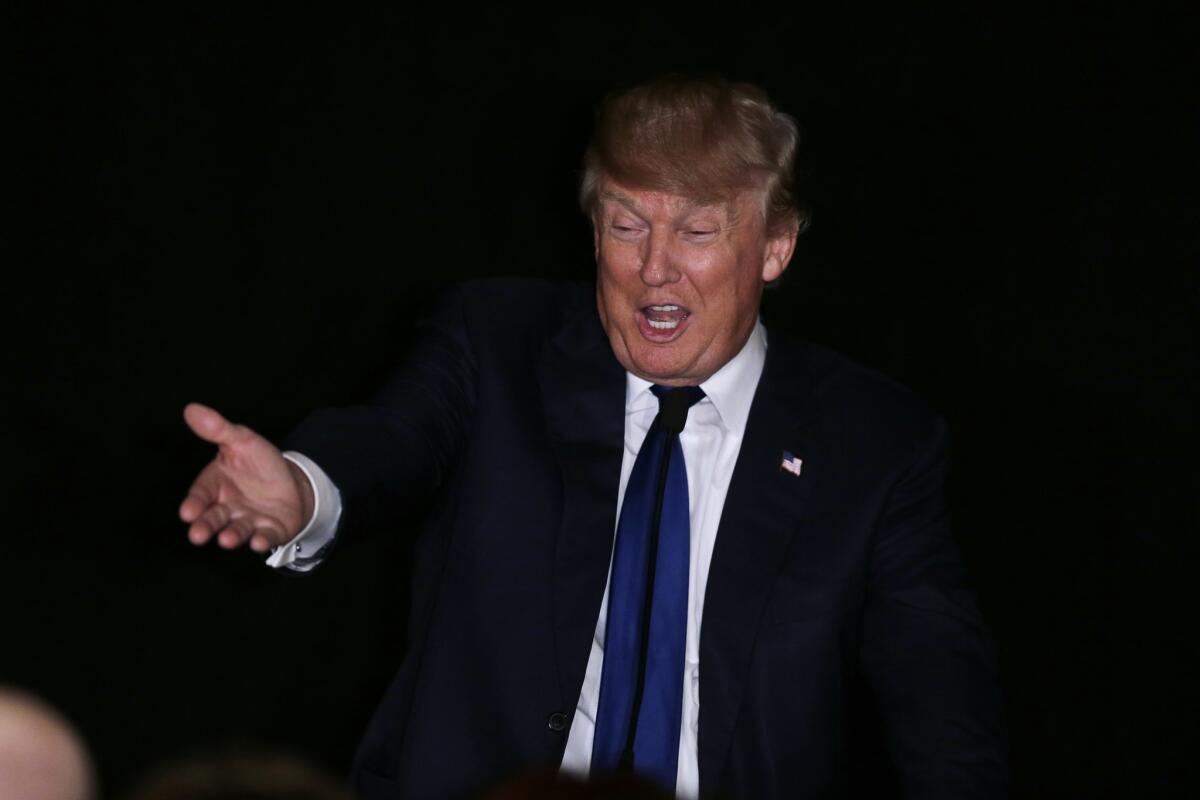Donald Trump’s support comes from every Republican ideology but not every class

Republican front-runner Donald Trump meets with police union members in Portsmouth, N.H., on Thursday.
- Share via
Reporting from Washington — Support for Donald Trump divides the Republican electorate along lines of class but not ideology with blue-collar voters — those without a college degree — giving him his biggest base of support.
The divide between the GOP’s blue-collar and white-collar wing has shown up repeatedly in polls throughout the election season. It’s clearly on display in new findings released Friday by SurveyMonkey, the online polling firm, which has been tracking the electorate since early this summer.
Trump’s support varies little by ideology. His backers closely mirror the distribution of very conservative, conservative and moderate voters within Republican ranks, SurveyMonkey’s data show.
That’s a contrast with some other candidates. Sen. Ted Cruz of Texas, for example, draws heavily from the party’s most conservative faction and does poorly with moderates. Jeb Bush, the former governor of Florida, does well among moderates but poorly among those who call themselves very conservative.
Instead of an ideological division, Trump has taken advantage of the sharp class divide among Republicans. He has consolidated support of the party’s blue-collar, non-college-educated wing, while the party’s more affluent, college-educated voters remain split among several candidates.
About one-third of Republican voters who have a high school education or less back Trump, which puts him far ahead of Ben Carson, the retired neurosurgeon, who is in second place with that group, at 17%. Ted Cruz at 9%, Sen. Marcio Rubio of Florida at 7% and Bush at 6% round out the top five.
But among those with a college degree or more, Trump’s lead is much smaller. He has 21% of the voters in that group, compared with 19% for Carson, 13% for Rubio, 9% for Cruz and 6% for Bush.
In recent election cycles, about half the GOP primary electorate has had a college degree.
Trump’s supporters are also less devoutly religious than many other Republicans. Among all GOP voters, 42% say they attend religious services at least once a week. Among Trump’s backers, 32% do so. At the other end of the spectrum, 37% of Trump’s backers say they seldom or never attend religious services, compared with 30% of the GOP as a whole.
Cruz and Carson draw most heavily from the devout. Half of Cruz’s backers and 55% of Carson’s say they attend religious services weekly or more often, the SurveyMonkey figures show.
One other important fact: Trump’s backers are much more likely to say they are certain of their choice than are other GOP primary voters. Almost half of Trump supporters, 47%, say they are “absolutely certain” of their decision.
Among backers of other candidates, the figure is much loser. Only 15% of Rubio’s supporters, for example, said they were that certain of voting for the Florida senator. Among Republicans as a whole, the figure was 35%.
For more on politics and policy, follow @DavidLauter
More to Read
Get the L.A. Times Politics newsletter
Deeply reported insights into legislation, politics and policy from Sacramento, Washington and beyond. In your inbox twice per week.
You may occasionally receive promotional content from the Los Angeles Times.











